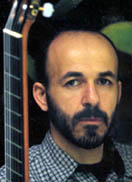Mahmoud Turkmani
 Born in 1964 in Halba in Northern Lebanon, Mahmoud Turkmani worked in his home country as a guitar soloist and performe with various music groups (among them his own ensemble Rabija and the folk group Willada). As the civil war made it impossible for him to study music in Lebanon, he went to Moscow where he graduated from the State Academy of Arts in 1989. After that, he studied with Oscar Ghiglia (1989/90, Basle Conservatory), Juan Carmona (1991/92, flamenco course in Andalusia) and especially Professor Stephan Schmidt (1994-1997, Berne Conservatory) who encouraged Turkmani to develop his own musical language out of his multi-cultural background. While studying in Berne (Switzerland), Turkmani also performed in several Swiss cities and in 1993 formed the guitar quartet Ludus.
Born in 1964 in Halba in Northern Lebanon, Mahmoud Turkmani worked in his home country as a guitar soloist and performe with various music groups (among them his own ensemble Rabija and the folk group Willada). As the civil war made it impossible for him to study music in Lebanon, he went to Moscow where he graduated from the State Academy of Arts in 1989. After that, he studied with Oscar Ghiglia (1989/90, Basle Conservatory), Juan Carmona (1991/92, flamenco course in Andalusia) and especially Professor Stephan Schmidt (1994-1997, Berne Conservatory) who encouraged Turkmani to develop his own musical language out of his multi-cultural background. While studying in Berne (Switzerland), Turkmani also performed in several Swiss cities and in 1993 formed the guitar quartet Ludus.  After the sudden death of his brother who was living in France, Turkmani came to discover his ability to express himself as a composer. He says: "I couldn't talk about my pain verbally. But after a year of sorrow, the music helped me and suddenly was bubbling out of me. I began to free myself by playing and writing which was some kind of self-therapy for me and not intended for the public. My friendship with Mansour Rahbany, one of Lebanon's great musicians and poets, inspired me to search for my Lebanese roots and transform them into a global language, thus making them accessible for a wider audience. Besides solo pieces, I wrote many quartets and also a concerto for guitar and thus developed this new language ever further."
After the sudden death of his brother who was living in France, Turkmani came to discover his ability to express himself as a composer. He says: "I couldn't talk about my pain verbally. But after a year of sorrow, the music helped me and suddenly was bubbling out of me. I began to free myself by playing and writing which was some kind of self-therapy for me and not intended for the public. My friendship with Mansour Rahbany, one of Lebanon's great musicians and poets, inspired me to search for my Lebanese roots and transform them into a global language, thus making them accessible for a wider audience. Besides solo pieces, I wrote many quartets and also a concerto for guitar and thus developed this new language ever further."
In the beginning, Turkmani used the guitar only (as a solo instrument and with his guitar quartet) but from 1998 onwards also pieces for oud, the Arabic lute, have found their way into his compositions. Oud, the "queen of the Arabic instruments", led Turkmani to basic questions of his own musical identity. He has grown up in two divergent musical systems, the Oriental and the Occidental. His profound knowledge of both systems made it possible for him to create connections between them without using superficial fusion techniques. How can the Maqamat world of sound with its richness of modi be combined with the Western tone system? How can complex Arab rhythms develop into a work of new music without getting stuck in shallow ?Arabisms'? So Turkmani daringly melts polyphonic styles and traces of Renaissance music with the melodic basis of Arab folk traditions. In the solo pieces, extraordinary neo-classical textures meet with Oriental expression and deeply moving moods.
Mahmoud Turkmani has collaborated, among others, with Kevyan Chemirani (the Persian percussionist) and Barry Guy (founder of the London Jazz Composers Orchestra), giving us a number of valuable recorded works.



